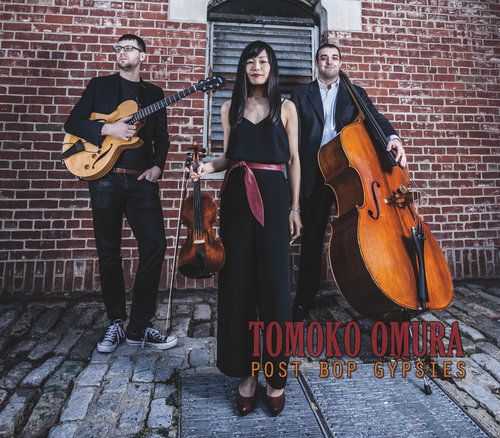Last week, I got to sit down to chat (in Japanese) with the New York-based fellow jazz violinist Tomoko Omura whom I genuinely admire and respect. Originally from Shizuoka, Japan, Tomoko has been chosen as a “Rising star” on critics poll on Downbeat Magazine for the past three years. Though this is no Downbeat, Tomoko was kind enough to participate in my post-Passover FOUR QUESTIONS Series, and I hope you enjoy!
Question No. 1
You have received many honors as a jazz violinist and a jazz artist. What do you consider your
 biggest achievement?
biggest achievement?
TO: My most significant achievement is my decision to leave Japan, my home country, and coming to the U.S. to set a new course for the rest of my life. After receiving my music ed degree in Japan, I still didn't want to become a school teacher.
Question No. 2
When did you decide to become a jazz violinist, and did your goal and dream ever change since the initial decision?
TO: I decided to become a jazz violinist at 21. My mother was a classical violin teacher, so I hated classical violin. But I liked jazz and began listening to every jazz violinist- John Blake, Zbigniew Seifert, Mark Feldman, Jenny Scheinman, Sara Caswell, Stuff Smith, Joe Venuti, Jean-Luc Ponty, Didier Lockwood, Christian Howes... I loved parts of each one of them, and I wanted to fuse my favorite elements from one of these very different players that I admired. Becoming my ideal jazz violinist became my dream, and that never changed.
Question No. 3
If there is anything in your life that you would like to change, will you share?
TO: Yes. I would like to make more time for the people I love and stay closer in touch with them.
Question No. 4
There are many jazz violinists in New York today. What makes you unique?
TO: What makes me different as a violinist might be the fact that I am not trying to be a jazz violinist. I want to become the complete musician, the best jazz musician I can be, and the violin just happened to be the instrument I play.
MO: Thank you so much, Tomoko. I can relate to you on that last comment. The violin is a very tricky instrument for jazz and "in" jazz as well. I find it admirable that you had a single vision and steadfastly stuck with it for all of these years in Boston and New York. Now I know why you play the way you do!
For information about Tomoko Omura's music and events, please visit her "excellent" website www.tomokoomura.com
Question No. 1
You have received many honors as a jazz violinist and a jazz artist. What do you consider your
 biggest achievement?
biggest achievement?TO: My most significant achievement is my decision to leave Japan, my home country, and coming to the U.S. to set a new course for the rest of my life. After receiving my music ed degree in Japan, I still didn't want to become a school teacher.
Question No. 2
When did you decide to become a jazz violinist, and did your goal and dream ever change since the initial decision?
TO: I decided to become a jazz violinist at 21. My mother was a classical violin teacher, so I hated classical violin. But I liked jazz and began listening to every jazz violinist- John Blake, Zbigniew Seifert, Mark Feldman, Jenny Scheinman, Sara Caswell, Stuff Smith, Joe Venuti, Jean-Luc Ponty, Didier Lockwood, Christian Howes... I loved parts of each one of them, and I wanted to fuse my favorite elements from one of these very different players that I admired. Becoming my ideal jazz violinist became my dream, and that never changed.
Question No. 3
If there is anything in your life that you would like to change, will you share?
TO: Yes. I would like to make more time for the people I love and stay closer in touch with them.
Question No. 4
There are many jazz violinists in New York today. What makes you unique?
TO: What makes me different as a violinist might be the fact that I am not trying to be a jazz violinist. I want to become the complete musician, the best jazz musician I can be, and the violin just happened to be the instrument I play.
MO: Thank you so much, Tomoko. I can relate to you on that last comment. The violin is a very tricky instrument for jazz and "in" jazz as well. I find it admirable that you had a single vision and steadfastly stuck with it for all of these years in Boston and New York. Now I know why you play the way you do!
For information about Tomoko Omura's music and events, please visit her "excellent" website www.tomokoomura.com




